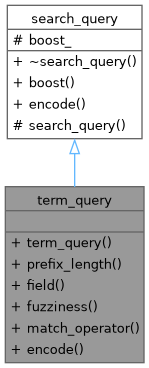A query that looks for exact matches of the term in the index (no analyzer, no stemming). More...
#include <couchbase/term_query.hxx>

Public Member Functions | |
| term_query (std::string term) | |
| Create a new term query. | |
| auto | prefix_length (std::uint32_t length) -> term_query & |
| Require that the term also have the same prefix of the specified length (must be positive). | |
| auto | field (std::string field_name) -> term_query & |
| If a field is specified, only terms in that field will be matched. | |
| auto | fuzziness (std::uint32_t fuzziness) -> term_query & |
| Perform fuzzy matching. | |
| auto | match_operator (couchbase::match_operator concatenation_operator) -> term_query & |
| Defines how the individual match terms should be logically concatenated. | |
| auto | encode () const -> encoded_search_query override |
| Public Member Functions inherited from search_query | |
| virtual | ~search_query ()=default |
| template<typename derived_query = search_query, std::enable_if_t< std::is_base_of_v< search_query, derived_query >, bool > = true> | |
| auto | boost (double boost) -> derived_query & |
| The boost parameter is used to increase the relative weight of a clause (with a boost greater than 1) or decrease the relative weight (with a boost between 0 and 1). | |
Additional Inherited Members | |
| Protected Member Functions inherited from search_query | |
| search_query ()=default | |
| Protected Attributes inherited from search_query | |
| std::optional< double > | boost_ {} |
Detailed Description
A query that looks for exact matches of the term in the index (no analyzer, no stemming).
Useful to check what the actual content of the index is. It can also apply fuzziness on the term. Usual better alternative is match_query.
- See also
- https://docs.couchbase.com/server/current/fts/fts-supported-queries-term.html server documentation
- https://docs.couchbase.com/server/current/fts/fts-supported-queries-fuzzy.html fuzzy search
- Since
- 1.0.0
- Committed
- Generally available API and should be preferred in production
Constructor & Destructor Documentation
◆ term_query()
|
inlineexplicit |
Create a new term query.
The mandatory term is the exact string that will be searched into the index. Note that the index can (and usually will) contain terms that are derived from the text in documents, as analyzers can apply process like stemming. For example, indexing "programming" could store "program" in the index. As a term query doesn't apply the analyzers, one would need to look for "program" to have a match on that index entry.
- Parameters
-
term the input string to be matched against
- Since
- 1.0.0
- Committed
- Generally available API and should be preferred in production
Member Function Documentation
◆ encode()
|
nodiscardoverridevirtual |
- Returns
- encoded representation of the query.
- Since
- 1.0.0
- Internal
- Internal interface
Implements search_query.
◆ field()
|
inline |
If a field is specified, only terms in that field will be matched.
- Parameters
-
field_name name of the field to be matched
- Returns
- this query for chaining purposes.
- Since
- 1.0.0
- Committed
- Generally available API and should be preferred in production
◆ fuzziness()
|
inline |
Perform fuzzy matching.
If the fuzziness parameter is set to a non-zero integer the analyzed text will be matched with the specified level of fuzziness.
- Parameters
-
fuzziness level of fuzziness (the maximum supported fuzziness is 2).
- Returns
- this query for chaining purposes.
- Since
- 1.0.0
- Committed
- Generally available API and should be preferred in production
◆ match_operator()
|
inline |
Defines how the individual match terms should be logically concatenated.
- Parameters
-
concatenation_operator operator to be used
- Returns
- this query for chaining purposes.
- Since
- 1.0.0
- Committed
- Generally available API and should be preferred in production
◆ prefix_length()
|
inline |
Require that the term also have the same prefix of the specified length (must be positive).
The prefix length only makes sense when fuzziness is enabled. It allows to apply the fuzziness only on the part of the term that is after the length character mark.
For example, with the term "something" and a prefix length of 4, only the "thing" part of the term will be fuzzy-searched, and hits must start with "some".
- Parameters
-
length the length of the term prefix
- Returns
- this query for chaining purposes.
- Since
- 1.0.0
- Committed
- Generally available API and should be preferred in production
The documentation for this class was generated from the following file:
- couchbase/term_query.hxx